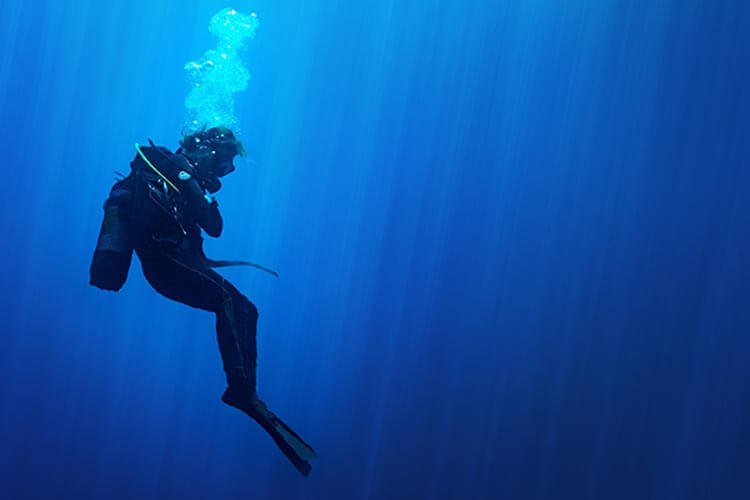
Small problems can rapidly escalate into very big problems underwater – so it’s essential that you raise any concerns you might have before diving
Many were the times, during my instructor career, when a diver would approach me and say, quietly, and often filled with embarrassment: ‘Crowley, I’m nervous about …’
My stock answer to this would be to say something along the lines of: ‘Well then, I’d really like to dive with you, because I’d rather dive with somebody open and honest about their worries than somebody who doesn’t raise their concerns and who ends up panicking underwater.’
That statement in itself provides a lot of reassurance and, more often than not, the diver’s nervousness could be quite easily addressed by talking through whatever it was they were worried about.
Novice divers really do worry about being attacked by sharks, or diving in a strong current, or accidentally going too deep, or not finding the boat on surfacing. Such concerns are straightforwadly managed: dangerous shark encounters are rare, and we don’t find that species here; remember your training and stay close to the reef; stay above your guide and you can never dive too deep; or – stay with me, we’ll be buddies for this dive.
As a long-term dive instructor and guide, I learned to be something of an amateur psychologist, recognising behaviours that indicated a person might be nervous: too chatty; too loud; overconfident; repeatedly fiddling with gear – there are many signs.
However, the truth of the matter is that no guide or buddy should ever be tasked with trying to find out if a diver is suffering from pre-dive nerves, because as divers, we have a duty to ourselves – and to every other diver in our group – to raise any concern we might have, no matter how trivial it might seem at the time, before jumping in the water.
We also have a duty, as divers, to recognise any concerns raised by others and treat them seriously and without judgement, because one person’s worries at the surface may spiral into uncontrollable panic underwater. This may threaten not just their own safety, but also that of others in the group that may have to deal with an unexpected emergency.
Be it about the dive plan, the conditions, your gear, your buddy’s gear, the location of the shotline or the boat’s accessibility after the dive – whatever it is, the issue needs to be dealt with before getting in the water.
Maybe it’s more personal. Maybe you had a tough day at work and didn’t sleep well the night before the dive; maybe you’re having some troubles with your partner; money worries; or something else that might distract you from your ability to conduct yourself safely underwater; whatever it is, if you feel your judgement may be impaired, you need to raise this with your guide or buddies.
You don’t necessarily need to give them all the details. ‘My mind’s been on other things of late’ might well be enough, and voicing your concerns doesn’t necessarily mean you have to sit out the dive. After all, scuba diving is an excellent, proven, treatment for all sorts of mental health difficulties, including anxiety, depression and PTSD – but failing to recognise you have a problem is vastly more dangerous than admitting that you do.
If the response to voicing your concerns or your nervousness is laughter, mockery or contempt, you should consider whether you are diving with the right calibre of people. Banter is one thing, but dismissal of concerns is a serious failure in attitude towards dive safety.
Remember that peer pressure is often self-inflicted, in that people are often afraid of speaking out against something with which they are not comfortable for fear of disappointing others, or embarrassing themselves in front of their peers, rather than being wilfully egged on by their peers to do something with which they are not comfortable.
The consequences of peer pressure, self-inflicted are not, can be fatal, so whatever it is that you might be nervous, or concerned about prior to a dive, make sure that those things are properly addressed during the planning phase of the dive, and never, ever be afraid of calling your dive if they’re not.
That’s the kind of buddy that I would want to dive with.
More top tips for improving your diving:
- Advanced open water courses are advancements, not ‘advanced’
- Scuba diving skills: how not to panic
- Scuba diving skills: weighing in
- Why refreshers are essential after a break from diving
- Scuba diving skills: underwater navigation
- Crown-of-thorns outbreak developing in northern Great Barrier Reef - 29 January 2026
- Six bodies recovered in search for missing Philippines divers - 27 January 2026
- DIVE’s Big Shot Light and Shadow – win an Aggressor Adventures liveaboard trip - 23 January 2026




